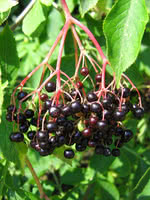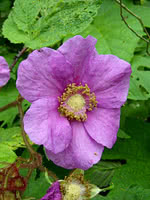Mon-Fri 9am - 5pm Mountain time
Black Elderberry vs Flowering Raspberry
Sambucus canadensis
Rubus odoratus
NOT AVAILABLE THIS SEASON - MIGHT RETURN
NOT AVAILABLE THIS SEASON - MIGHT RETURN
Black Elderberry is a deciduous shrub native to eastern North America. You can plant this shrub in moist areas and it will help stabilize your soil. You can also use it on rural properties anywhere you'd use a lilac.
Black Elderberries are considered to be partially self-pollinating. So while they will still produce some berries without cross-pollination, planting with another variety will increase yields. Consider planting with Ranch Elderberry or Bob Gordon Elderberry.
Warning: the seeds, stems, leaves, roots, and uncooked berries of the Black Elderberry are poisonous to humans when eaten in quantity. You should cook the berries to make them safe for human consumption.
The Flowering Raspberry is an ornamental shrubby plant that blooms with fragrant light purple flowers throughout the summer and has a large, decorative foliage of bright green leaves. The flowers resemble that of a wildrose, and the foliage turns a bright yellow in the fall. This cultivar produces small red raspberries, similar to that of a thimbleberry, but the fruit is mostly tasteless.
The Flowering Raspberry, also known as Virginia Raspberry or Purple-Flowered Raspberry, makes a great hedge plant and is a good choice for attracting birds to your yard.
Black Elderberry Quick Facts
Flowering Raspberry Quick Facts
Toxicity: leaves, stems, and uncooked berries are poisonous to humans

